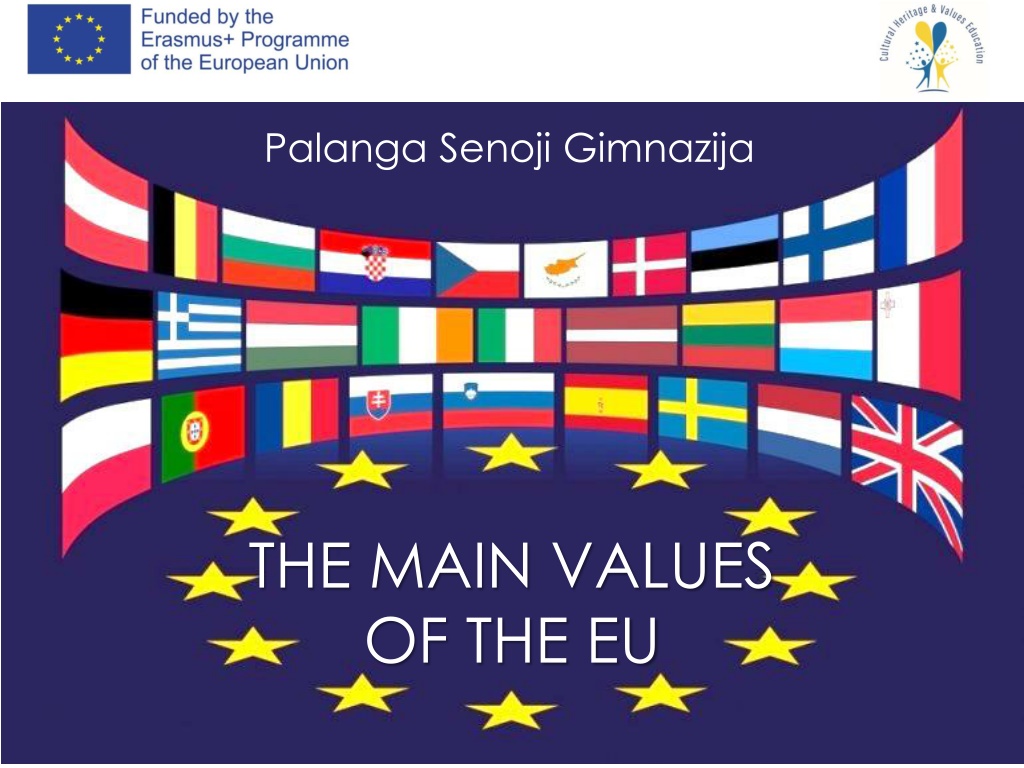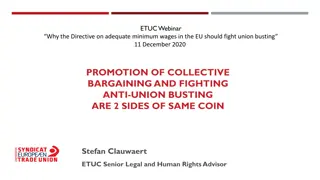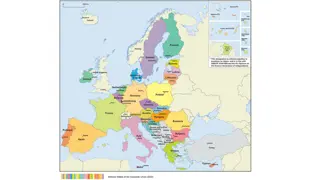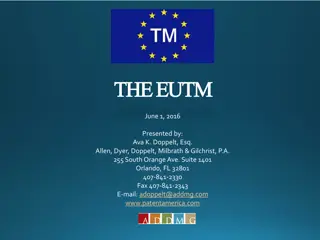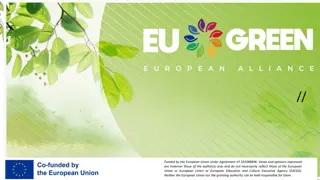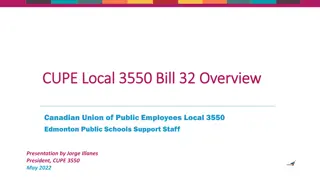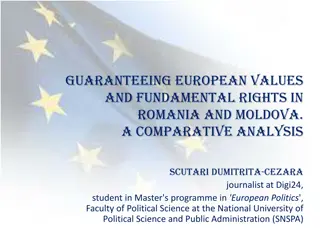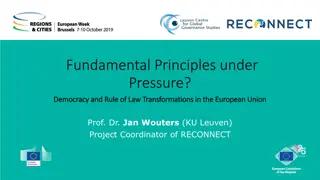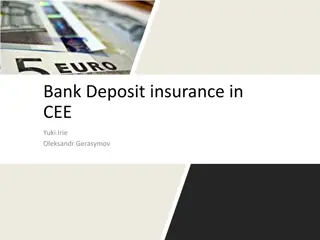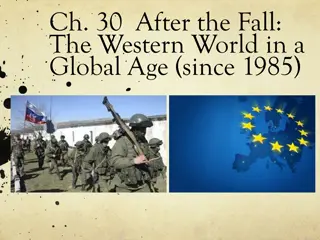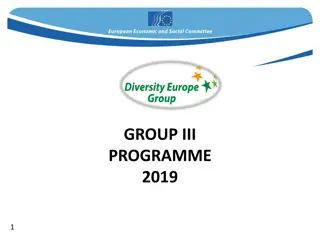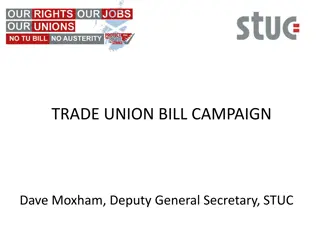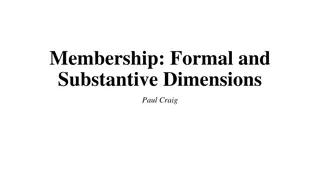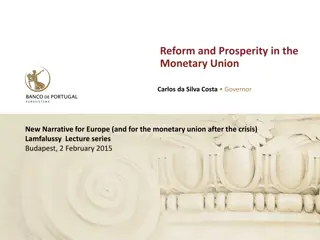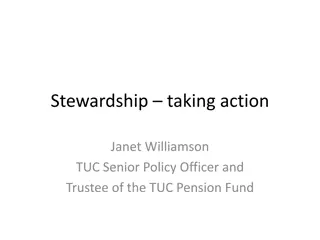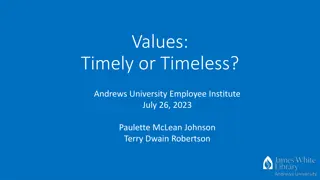Understanding the Core Values of the European Union
The main values of the EU, as defined in the Lisbon Treaty and the charter of the EU's fundamental rights, include human dignity, freedom, equality, and democracy. Human dignity is inherent to every individual, reflecting their moral relationship with themselves and society. Freedom grants the ability to behave as desired, while equality ensures equal rights and protection under the law for all citizens. Democracy in the EU allows every adult citizen to participate in governance by exercising political rights like voting and standing as a candidate.
Download Presentation

Please find below an Image/Link to download the presentation.
The content on the website is provided AS IS for your information and personal use only. It may not be sold, licensed, or shared on other websites without obtaining consent from the author. Download presentation by click this link. If you encounter any issues during the download, it is possible that the publisher has removed the file from their server.
E N D
Presentation Transcript
Palanga Senoji Gimnazija THE MAIN VALUES OF THE EU
The values are the core of the EU and are defined in the Lisbon treaty and the charter of the EU s fundamental rights.
HUMAN DIGNITY Human dignity is inviolable What does it mean and why must it be like this? There are three important prerequisites for this. First. It is inherent to every human being. There is nothing more or less here. Second. This counterpart. The car can be replaced with another one of the same kind. However, it is impossible to replace the same person. This is what the philosopher Immanuel Kant says, Whatever has a price, can be replaced by its equivalent. Dignity is the value taht creates irreplaceability. Third. Whoever has dignity, they also have rights. All people have certain rights simply because they are human beings. For example, people have the right to live. value has no equivalent Dignity reflects a man s moral relationship with himself and the relationship of society with a man.
FREEDOM Freedom is a person s ability to behave or do something however they want. Many wars, conflicts, arguments occur and are still occurring because of the need to restrict or fully abolish freedom. One punishments known to a person is the deprivation of freedom, because once a person is deprived of his freedom, he sort of loses his powers, his voice, himself. To lose freedom is to lose the ability to grow and to improve. * The freedom to move grants the citizens of the European Union to freely live and to move. * The freedom of a person is a right to a private life, mind, religion, gatherings, self expression and freedom of information - which are protected by the EU charter of fundamental rights. of the biggest
EQUALITY It s every citizen s equal right to be protected by the law. Every field of EU s policy is based on the equality of women and men, it s the foundation of Europe s integration and it s applied to every field. The principle of equal pay for the same included into the Rome s contract in 1957. Although inequality still exists, EU has made a huge progress. It s an equal status of people s social groups (for example in the society or in the country.) Everyone s usage of equal political, civil rights; social lawful principle (for example against the law, sex equality, against discrimination or racism.) job was equality
DEMOCRACY Although there isn t one exact definition of freedom and equality are the main values from ancient times that haven t changed. principles are realized through every citizen s right against the law and equal political rights (e.g. voting and standing as a candidate). EU acts as represented democracy. Being EU citizen means using political rights. Every adult EU citizen has the right to vote and stand as candidate in Parliament elections. These rights are guaranteed in the country of residence or origin. democracy, These Democracy (gr. folk' + 'manage') means a management form, where all citizens have right to act in country s governance, unlike the form, where the control belongs to an exclusive group of people or an autocrat. European
HUMAN RIGHTS ASSURANCE Human protected Charter Rights. These human rights include the right to be no longer sex, racial or ethnic origin, religion or belief, disability, age or sexual orientation, the right to the protection of personal data, the right to apply for justice. problems. rights by Fundamental are EU the of discriminated by The realization of human rights is the most acknowledged and ever-present problem of human existence, integrating all other
THE RULE OF LAW Rule of law is a "constitutional state" in which the activities of governmental power are restricted by the law. Rule of law can also be described as a state where law is dominating , unlike the tyranny when a single ruler has absolute power. based on the principles of rule of law. No matter what everything is governed by agreements that were free-will Member States. Independent institutions ensure Member States authorized the Court of Justice of the European investigate the cases as last instance and everyone must decisions. EU activities are the EU does, signed by its legal justice. law and Union to follow their
SURVEY To find out what students think about values, we prepared a survey asking students how they perceive values and how they value them. After analyzing the answers we have obtained the following results:
SURVEY 1. Define the meaning of value from your perspective.
SURVEY 2. What values do you miss in the gymnasium?
SURVEY 3. List the most important values in your life. What is most important to you in life?
SURVEY 4. What 5 values do you hold most in your mind? Values 45 40 35 30 25 20 Values 15 10 5 0
SURVEY 5. Who, in your opinion, inspires the person to develop his/her values? Influence Purpose, attitude Friends, family, surroundings Books, films A person himself School Experience
SURVEY 6. Who hinders the most when cherishing the values? Interfence Nobody Friends Self-doubt Interfence Stubbornness Environments, surrounders Laziness 0 5 10 15 20 25 30 35
SURVEY 7. Are values being discussed during any class? In what subjects? Are the values discussed? In which subject the most? Moral education Yes Lithuanian language The other No
SURVEY 8. How do you rate a teacher? Assessments Selfless It depends on his/her behavior He/She is my authority Assessments I don't rate I respect him/her 0 10 20 30 40 50 60
SURVEY 9. Would you be honest if you had no control over yourself? Yes Most of the time I don't think so
SURVEY 10. Do you consider yourself an honest person? No Most of the time Yes 0 10 20 30 40 50 60 70 80
SURVEY 11. What values do you think are 'devalued' these days? Values 25 20 15 10 5 Values 0
THANKS FOR YOUR ATTENTION!
